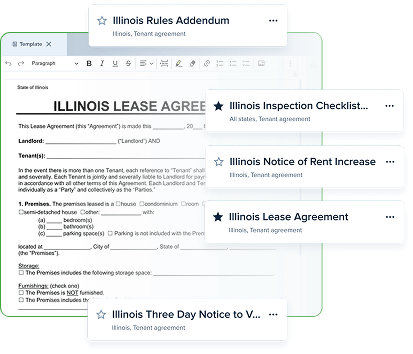Lease Agreement
What is a standard lease agreement? It is a legally binding contract between a tenant and a landlord that spells out each party's duties.
The agreement governs the obligations of both sides, including the number of people that can live in an apartment, subletting rules, the responsibilities of each party, and what to do if one or both sides fail to follow the rules.
It's important to remember that lease agreements safeguard both the landlord and the tenant. As a result, the more comprehensive a lease agreement is, the less likely it is that there will be misunderstandings — or legal problems — over the course of the lease.
Lease Agreements
Cover the rules and responsibilities of each party.Generate a document with our document builder
Customize it using auto-fill elements if needed
E-sign and require signatures from tenants
What you need to know
Why Do I Need a Lease Agreement?
Informal lease agreements may be acceptable, but you should always insist on having the conditions solidified in writing to safeguard your rights. Renting an apartment without an official written contract might lead to issues in the future. Remember that a lease agreement will help both landlord and tenant from misunderstandings and to avoid potential problems in the future.
What Should I Include in a Lease Agreement?
Certain features of lease agreements are standard, such as the names of the two parties and the rental unit's address. However, leasing agreements vary based on the landlord's wants and the law's limitations.
Recommended Lease Provisions:
The rental property's description (including property addresses, amenities, etc.)
Length of the lease (term)
Rent price and due date
Fees for late payments (if applicable)
Pet-related rules
Parameters governing when the landlord is allowed to enter the premises
Amount of the security deposit
When Does a Residential Lease Become Effective?
Once all parties, including the landlord and tenants aged 18 and over, have signed the lease, it becomes legally binding. At the time of signing, the tenant may be required to hand overpayment for the security deposit, first month’s rent, and any proration costs. On the start date of the lease, the landlord is responsible for granting the tenant access to the premises.

